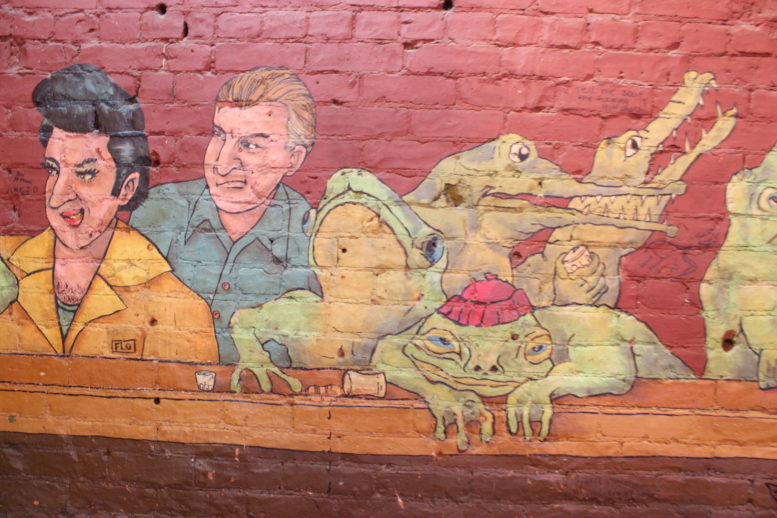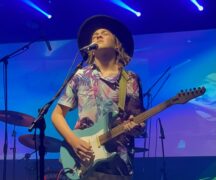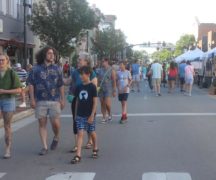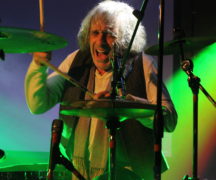By DAVID DUPONT
BG Independent News
When Steve Feehan and Tony Zmarzly bought Howard’s Club H earlier this year, it was with the intent of reviving the venerable night spot as a top local music venue.
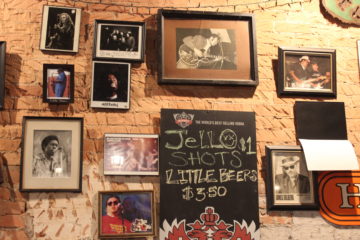
Hall of Fame of previous performers behind back bar at Howard’s. Michael Katon’s photo is top left.
The fruits of those ambitions will be evident this weekend. Blues rocker Michael Katon, who played the club regularly from 1982 through the early 2000s, will return for a show Friday. Then on Saturday at 10 p.m. a crew from WBGU-TV will be on hand to tape a triple bill of younger acts – Tree No Leaves, Indian Opinion and Shell.
“Howard’s has always been a music venue, a place to hear live music with a bar to go with it,” Feehan said. “We want to foster a community as much as we can. That’s what’ needed in this day and age.”
And that’s what Howard’s was in its heyday.
The bar traces its genesis to 1928 when Fred Howard opened a candy shop where the Wood County Library now sits. Legend has it, Feehan said, that the candy store also fronted a speakeasy that was popular with college football players. When Prohibition ended, Howard’s became a bar.
The details of that and other stories are hard to pin down, he said. That’s part of the fun.
“After we took ownership, then we realized what we had,” Feehan said. People would walk through the door, and share lore of the club, which moved across the street in the early 1970s. “We almost felt more like curators than owners.”
Both Zmarzly and Feehan experienced that history as teenagers playing in bands at Howard’s. Feehan played piano with the Madhatters and Zmarzly is still active as a drummer and guitarist in AmpWagon.
Feehan remembers crossing paths with Katon back in the 1980s. After a hiatus of more than 10 years, Katon returned to the club during this year’s Black Swamp Arts Festival. He played a late night Saturday show at the club before closing the festival on the Main Stage.
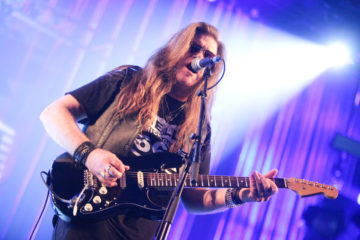
Michael Katon (Photo provided)
He was glad to be back, Katon said, in a telephone interview. Howard’s was packed just as it was in the old days.
Katon, who tours extensively in Europe, said he’s played clubs in England that hosted Jimi Hendrix, The Who, Black Sabbath, and The Animals.
Those clubs had a well-worn, lived in feel. “Same with Howard’s,” he said.
The BG club is one of his favorite places to play. He even said he’d buy it and play there all the time, before reflecting on just how hard it is to run a club.
“I hope some of the kids coming in appreciate something funky and lowdown. …The funkier the better in my book,” he said.
That’s true of his high-powered blues rock sound as well.
Howard’s is similar to the clubs where he first heard the blues and then where he started playing.
His older brother, a member of the legendary Ann Arbor band The Prime Movers, would bring him to visit. The 13-year-old Katon would sit at the bar under the eye of the bartender while the band played. Top blues artists who were passing through town would stay at the band’s house.
When he told one musician that he liked Eric Clapton, Katon was instructed to check out all the bluesmen that inspired Clapton. Katon stocked up of records of all the greats, and his direction was set.
Though his style is rooted there, he heard plenty of exposure to big band and country music at home in Ypsilanti. Later in his teens he explored jazz, even mastering “Giant Steps,” John Coltrane’s harmonic maze that’s testing ground for improvisers to this day.
Katon remembers starting to play at Howard’s in 1982. Back then he may do five nights straight at the club. The band would play until 2, then party with fans until 5 a.m. By 2 p.m. they’d be back at the bar drinking until showtime. “We had a hell of time,” he said.
But he gave up drinking in 1990 and quit smoking. “All that stuff becomes a burden. It’s too much work,” he said. The music stays faithful that wild party spirit.
Lately, Katon has had to cut way back on live shows. He’s living with his 94-year-old mother who requires almost constant care. So he’s not sure when, after Friday’s show, he’ll be back to BG, but he’d like to resume playing regularly at the club.
He’s also pleased to see another generation emerging in the form of Cameron Green. The teen guitar wiz is about the age as Katon was when he started hanging out with The Prime Movers, and when Feehan and Zmarzly started playing at Howard’s.
Feehan said he first heard Green when he and his band showed up for an open mic at the club this summer and blew everyone away.
Feehan said the club wants to foster connections with younger musicians. He said after being away from the scene for a few years, he’s been impressed by the level of musicianship displayed by bands such as those featured on Saturday night.
The historic aura of Howard’s Club H is what attracted WBGU producer Joe Goodman to the idea of filming at the club.
Goodman recently came to Bowling Green from New York City where he was active as a freelance producer, editor and marketer.
He was approached about the possibility of filming the Saturday show and loved the idea of capturing Howard’s “gritty, rock ‘n’ roll atmosphere” on film. He wants “make it cool and gritty to fit the Howard’s aesthetic.”
The idea is to create a pilot of a series on local music. The owners, he said, have been “very accommodating.” The project also gives students a chance to film on location.
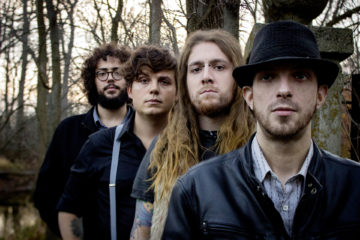
Tree No Leaves (Photo provided)
Dustin Galish, the leader of Tree No Leaves and organizer of the Saturday show, said the event both celebrates the venue and celebrates the local bands.
He said his band and Indian Opinion, a jam band of “jazz kids” from the university, had been wanting to record live, and the new sound system at the club now allows for multitrack recording.
Shell is made up of younger college students and fits well with the “psychedelic” and “avant garde” tenor of the other two groups.
Feehan said there are a few more changes in the works —a few more lights, a smaller stage on the south section of the club and maybe a back room recording suite.
The club launched GoFundMe campaign in the summer to help fund some of the upgrades, notably the patio out front. Some criticized the move, he said, but it was a chance for fans to have more “vested interest” in the venue, and “it definitely helped us in the early stages.”
The club will be revisiting its back pages later this month with a reunion concert of Crazy Eddie, Dec. 17, and the return of Downtown Brown, Dec. 30.
He’s also hoping to work with more musicians from campus such as the Roots Music Club. One evening a group of new music improvisers arrived to stage a spontaneous show.
“It’s important to support local musicians,” Feehan said. That’s key as the new owners write the next chapter in the legend of Howard’s Club H.

